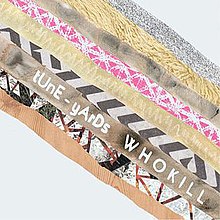Whokill
| Whokill | ||||
|---|---|---|---|---|
 |
||||
| Studio album by Tune-Yards | ||||
| Released | 19 April 2011 | |||
| Genre | Experimental pop, noise pop | |||
| Length | 42:12 | |||
| Label | 4AD | |||
| Tune-Yards chronology | ||||
|
||||
| Professional ratings | |
|---|---|
| Aggregate scores | |
| Source | Rating |
| Metacritic | 86/100 |
| Review scores | |
| Source | Rating |
| AllMusic | |
| The A.V. Club | B+ |
| Chicago Tribune | |
| The Guardian | |
| MSN Music | A |
| NME | 8/10 |
| Pitchfork Media | 8.8/10 |
| Q | |
| Rolling Stone | |
| Spin | 8/10 |
Whokill (stylized as w h o k i l l) is the second full-length release by Merrill Garbus' project Tune-Yards. It was released on 4AD Records on 19 April 2011.
It was the number one album of 2011 on The Village Voice's annual Pazz and Jop critic's poll The album was recognized as one of The 100 Best Albums of the Decade So Far by Pitchfork Media in August 2014.
The album covers a "formidable range of genres and styles" including acoustic folk, rock, R&B, punk rock, funk, free jazz and Afrobeat. As on her first album, Bird-Brains, Whokill relies on heavily layering looped sounds – notably vocals, drums and ukulele – which multi-instrumentalist/vocalist/composer Garbus uses to create her sound.
Unlike the lo-fi Bird-Brains, which was self-recorded on a handheld voice recorder, Whokill was recorded in studio, resulting in a fuller and clearer sound. It was produced by Garbus and engineered by Eli Crews at New, Improved Studios in Oakland, California. Tune-Yards also fleshed out the line-up to reflect the live shows, adding bass player Nate Brenner, who co-wrote some of the album's songs, and using horns on several tracks.
Thematically, Whokill is concerned with "power struggles that arise from inequity and lead to further cruelty and injustice," rooted in issues of privilege around race, gender and class. The album opens with "My Country," "a love-hate anthem" about America, which subverts the patriotic song "My Country, 'Tis of Thee."
The lyrics of Whokill are concerned with violence in different forms, including police brutality ("Doorstep", "Riotriot"), neighborhood violence ("Gangsta"), and more figurative forms of violence, as on "Powa," where Garbus tells a mirror, "you bomb me with life's humiliations every day / you bomb me so many times I never find my way." Garbus is both repelled and fascinated by violence: in "Riotriot," Garbus secretly fantasizes about the police officer who arrests her brother, before announcing "there is a freedom in violence that I don't understand / and like I've never felt before"; and on the final track, "Killa," Garbus declares, "All my violence is here in the sound."
...
Wikipedia
